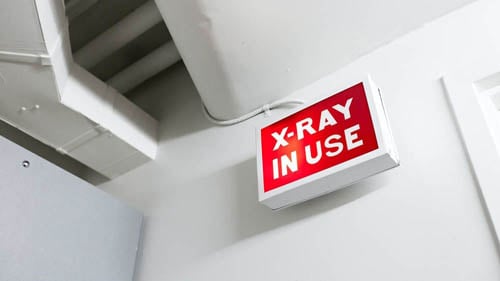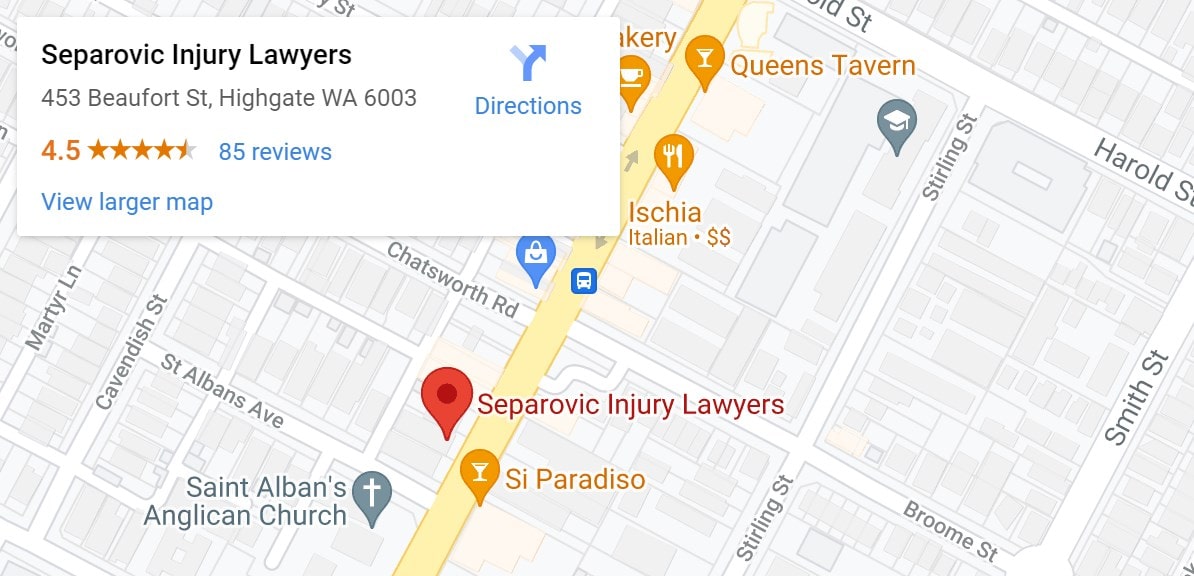Have You Been Injured at Work and Can’t Go On?
Separovic Injury Lawyers will fight for every dollar of compensation you deserve.
How Much Is Your Claim Worth?
Answer a few simple online questions and within 24 hours a senior injury lawyer will email your lump sum payment estimate.
Work Injury and Illness Compensation
Work related accidents and illnesses can be extremely traumatic, painful and stressful events that can instantly crush a worker’s aspirations and plans for the future.
Despite work related accidents and illnesses being relatively common, Australian workers often try to ‘tough it out’ or ‘suck it up’ when dealing with these types of problems. Many of us feel embarrassed, weak or guilty talking about these issues or claiming compensation. This is a real problem because workers’ compensation can be claimed in regards to most work-related injuries or illnesses. If you cannot cope with pain, stress or discomfort any longer and need assistance, please call Separovic Injury Lawyers for free – expert – no obligation legal advice regarding the pro’s and con’s in making a workers’ compensation claim.
Free Compo Claim Survival Kit
If you have been injured at work this kit will help you get back on your feet and ensure you get the most out of your claim.
Frequently Asked Questions
I have Suffered an Injury / Illness at Work. Can I Claim Compensation?
If you suffer a work-related, physical or mental illness or injury, the West Australian workers’ compensation system helps workers return to work and compensates for lost wages, medical expenses, rehabilitation costs, medications and travel while they are unable to work. Here, the legal definition of exactly, who is a ‘worker’ is broad. Many workers are unaware that they may be able to make a claim for workers’ compensation if they:
.
- work full-time, part-time or casually;
- work seasonally or on commission;
- work for a wage or a salary;
- work as a contractor, sub-contractor or working director;
- work under a contract of service or apprenticeship;
- are an overseas worker;
- are over the age of 65;
- are employed in Western Australia but your work related incident occurred interstate or overseas; or
- if you resigned from, were terminated or made redundant by the enterprise where you suffered your injury or illness.
What Exactly is a 'Work Related' Illness or Injury?
The WA Workers’ Compensation scheme covers the following types of incidents:
.
- Injuries that occurred while working;
- Injuries that occurred while travelling for work;
- Injuries that occurred while receiving medical treatment or undertaking a return to work program for a separate work injury;
- Diseases that were materially caused by work; and
- Diseases or pre-existing medical conditions that were aggravated to a significant degree or made worse by work.
Can I Claim for Stress, Anxiety, Depression or Other Mental Illnesses?
Workers’ compensation claims can be made if you suffer from stress, anxiety, depression or other mental illnesses that were materially caused or significantly aggravated by particular work related actions, events or exposures.
Safe Work Australia provides the following useful list of incidents that could cause work related stress or mental illness:
- Work pressure—mental stress arising from work responsibilities and workloads, deadlines, organisational restructure, workplace conflicts and workplace performance or promotion issues;
- Work-related harassment &/or workplace bullying—repetitive assault and/or threatened assault by a work colleague or colleagues; and repetitive verbal harassment, threats, and abuse from a work colleague or colleagues;
- Exposure to workplace or occupational violence—includes being the victim of assault by a person or persons who may or may not be work colleagues; and being a victim of or witnessing bank robberies, hold-ups and other violent events;
- Exposure to traumatic event—disorders arising from witnessing a fatal or other incident;
- Suicide or attempted suicide—includes all suicides regardless of circumstances of death and all attempted suicides;
- Other mental stress factors—includes dietary or deficiency diseases (Bulimia, Anorexia); and
- Other harassment—being the victim of sexual or racial harassment by a person or persons including work colleague/s.
To make a stress claim it needs to be confirmed that you are suffering from symptoms that are classified by workers’ compensation legislation as an ‘illness’ or ‘injury’. In simple terms, if you have attended a counsellor, GP, psychologist or psychiatrist in regards to work related stress or mental health issues, you may be able to make a claim.
What if I Was at Fault or Negligent and my Employer Wasn't?
The West Australian workers’ compensation scheme operates on a ‘no-fault’ basis. If you suffer a work-related injury or illness, and you were negligent or at fault, you are still entitled to claim for workers’ compensation. It is also important to note that, when you make a claim there is no requirement for you to prove that your employer was at fault or negligent.
What Entitlements Can a Workers' Compensation Claim Provide?
If your workers’ compensation claim is accepted by the insurer you may be entitled to compensation for financial loss, permanent impairment and treatment expenses.
Permanent Impairment
Pursuant to the “Second Schedule” of the Act you will be eligible to receive a lump sum payment for your injury depending upon the final permanent impairment medical assessment and subject, if there is a dispute, to legal negotiation between the parties or court determination.
Financial Loss
If you are not able to work due to your injury or illness, when your workers’ compensation claim is accepted by the insurer, your employer is obligated to pay weekly compensation payments as per your usual wage payment arrangements. Your employer can be penalised if they do not make your compensation payments in accordance with your usual wage payment process.
Unless you are under an award, wages will usually be reduced to 85% from the 14th week post injury. The maximum weekly compensation payment is capped at $2,647.30 gross.
The maximum amount of compensation or weekly payments you can receive for loss of earnings is referred to as the ‘prescribed amount’. In special circumstances, if you are unable to return to work, these payments can be extended.
Treatment Expenses
If your workers’ compensation claim is accepted by the insurer you will be able to claim compensation for reasonable medical and rehabilitation expenses as well as other costs for travel and lodging.
The medical and rehabilitation expenses that can be claimed include:
- first aid, paramedic and ambulance costs;
- medication and prescriptions;
- medical or surgical treatment;
- nursing services;
- X-rays, CT and CAT scans, MRI’s and Ultrasounds;
- medical aids and equipment;
- treatment by medical or rehabilitation specialists;
- dental treatment;
- physiotherapy services;
- chiropractic services; and
- other medical treatments, including occupational therapy, speech pathology, exercise physiology, osteopathy and clinical psychology.
While, you are able to attend medical and rehabilitation providers of your choice, it is important to note that, medical and rehabilitation expenses are capped under the prescribed amount system.
The travel and lodging expenses that can be claimed include:
.
- travel expenses incurred whenever you are required by a medical practitioner, your employer or their insurer to attend a medical or rehabilitation appointment; and
- reasonable accommodation and meal expenses for workers required to travel long distances in order to seek treatment or rehabilitation.
What Is a Common Law Claim?
If you have suffered a 15 % (or more) whole person impairment you may be able to make a common law claim against your employer. These claims are made in addition or on top of claims made under the Workers’ Compensation and Injury Management Act 1981. In order to make a common law claim for damages:
- you must have a whole person impairment of at least 15 %; and
- it must be proved that your injury was caused by your employers negligence in failing to maintain a safe workplace/system of work.
A common law claim is made outside of the statutory workers’ compensation system and the ability to make a claim is determined by a specific timeframe known as the ‘termination date’. The rules regarding termination dates and common law claims have been developed over hundreds of years by Australian judges and courts. Common law claims require that an additional burden of proof is satisfied and that the employer is found negligent and that this negligence caused the workplace accident or illness to occur. Common law claims can involve greater levels of legal complexity and Separovic Injury Lawyers has the expertise and experience required to support you through this process, to settle your claim and secure you every dollar of compensation you deserve.
How Can I Make a Workers' Compensation Claim?
A workers’ compensation claim is usually made by:
- Seeking medical attention and notifying your employer that you have suffered a work related injury or illness;
- Visiting a medical practitioner of your choosing to obtain a first certificate of capacity;
- Completing the Workers’ Compensation Claim Form (please get in touch if you need assistance completing this form);
- Copying your completed forms and giving your employer the originals;
- Your employer then has 5 days to lodge your workers’ compensation claim application with their insurer; and
- The insurer has 14 days to process your claim and confirm whether it has been accepted, disputed or pended.
Personal injury law claims in WA are predominately settled by negotiation. This is an adversarial system where the insurer is under no obligation to provide you with a particular or equitable level of compensation. Most insurers will appoint legal representatives to negotiate on their behalf and given that this is a specialist and highly technical area of the law you place yourself at a significant disadvantage if you do not have legal representation. If you need assistance or support with any of these steps please get in touch with Separovic Injury Lawyers.
How Much Workers' Compensation Can I Claim?
The amount you will be able to claim will depend on the unique and particular facts involved in your injury or illness. Separovic Injury Lawyers will be able to provide you with an approximation of the compensation that you could claim for at the conclusion of your initial client meeting and more specific advice after your injury has stabilised and before proceeding to a settlement conference.
Sometimes the insurer may provide you with an offer to settle your claim for a lump sum payment. You are under no obligation to accept such offers and Separovic Injury Lawyers strongly recommends that you seek legal advice before considering any such offer.
Can I Also Claim Compensation from Third Parties That Were Involved in My Injury?
Working arrangements and environments are becoming more and more complex. It is not uncommon to work with multiple companies, parties, contractors, sub-contractors and individuals on one worksite and all at the same time.
If a legal entity (i.e. sole trader, partnership or company) other than your employer was partly or fully responsible for your work related injury or illness you are legally entitled to bring a common law negligence claim against the third party seeking damages for your financial losses and injuries.
How Long Will a Work Accident Compensation Claim Take to Settle?
How long a workers’ compensation claim will take to settle will depend on:
- How serious your injuries are;
- What treatment you require;
- What rehabilitation you require;
- How long it takes for your injuries to stabilise;
- Whether you are able to make a common law claim;
- Whether you are able to make a claim against any third parties; and
- How long it takes to negotiate a settlement with the defendant and their legal representatives.
Many claims handled by Separovic Injury Lawyer are settled within 2 years from the date of accident.
Why Appoint a Personal Injury Lawyer to Manage My Claim?
The majority of personal injury law claims in WA are settled by negotiation. This is an adversarial system where the insurer is under no obligation to provide you with an equitable level of compensation. Most insurers will appoint legal representatives to negotiate on their behalf and given that this is a specialist and highly technical area of the law you place yourself at a significant disadvantage if you do not have legal representation to safeguard your interests.
Separovic Injury Lawyers have worked hard to establish our reputation as tough and tenacious negotiators. Please contact us if you would like to ensure that you maximise all of the compensation you deserve to receive.
What If I Had Pre-Existing Medical Conditions?
The legislation provides a broad definition of the term ‘injury’ and includes easily identifiable work accidents, illnesses that developed over time or a subtle irritation, aggravation or exacerbation of a pre-existing medical complaint. This means that you do not have to have suffered a specific accident to make a claim for workers’ compensation. You could be suffering from symptoms that have developed gradually over the course of your employment from repeated exposure or activity (i.e. regular inhalation of toxic fumes or daily lifting of heavy bags of cement).
Who Pays for My Workers' Compensation?
All employers in Western Australia must have workers’ compensation insurance for its employees. If you suffer a work related injury or illness your employer’s insurance company will pay your compensation.
Can I Make a Claim for a Superannuation Total and Permanent Disability Lump Sum Payment?
In addition to your workers’ compensation or common law claim, if you suffered an illness or injury which has rendered you totally or partially unfit for work you may be eligible to make a Superannuation Total and Permanent Disability (“TPD”) benefit claim. If you were previously injured at work or in a car accident and have already received a lump sum payment, this will not preclude you from receiving a further lump sum payment from a Superannuation TPD claim.
Do I Have to Make a Workers' Compensation Claim Within a Particular Time Frame?
Preferably within 12 months from the Date of Accident
There are a number of critical dates that must be complied with in order to successfully make either a workers’ compensation or common law claim.
If a workers’ compensation claim is lodged with the employer more than 1 year from the date of accident the defendant can argue that they suffered material prejudice and request that the claim be set aside. Here, the defendant argues that as a result of the plaintiff’s delay in providing notice of their intention to make a claim the defendant was denied the opportunity to investigate why the accident occurred and to ensure that it does not occur again.
Termination Date Time Limits
In common law claims the worker must take steps to activate the claim and obtain a whole person impairment assessment before the expiration of the “12 month termination date”. In many claims the 12 month termination date expires shortly after the first 12 month anniversary date of the accident and can be extended for a further 12 months. This is a “tricky” area of the law and Separovic Injury Lawyers strongly recommends all workers to seek legal advice well before the expiration of the termination date. Failure to do so may very well result in the worker being statute barred from accessing common law damages. Put simply in a claim involving a serious injury it could mean the difference between a $100,000 versus a $1,000,000 final settlement payment.
Three Year Statute of Limitation Period
For common law claims involving third parties a 3 year statute of limitation period applies from the date of accident.
Solutions for Common Workers’ Compensation Issues
A work related accident or illness can quickly become one of life’s greatest and most unpleasant challenges. One moment you are happily working away. The next moment you are in a world of pain and left wondering how you will survive.
In an instant, your life is focussed on obtaining diagnosis, organising and coping with treatment, and, if all goes well, dealing with the challenges of rehabilitation and return to work programs. Do you feel upset because you made a rare mistake or angry because your employer did not provide a safe workplace? Will there be a job for you to return to? Will you be physically and mentally able to do your pre-injury job? These are the struggles that injured workers often have to deal with while coping with guilt, shame, a lack of mobility and independence, anxiety and pain.
Have you been injured at work?
Can you claim workers’ compensation?

Suffering from stress, bullying or harassment at work?
Can you claim compensation for mental health issues?

While possibly at their lowest, the injured worker is faced with the prospect of not being able to earn a living. What happens when sick leave, employee entitlements and savings run out? For many workers, it is once they get to this desperate stage that they are forced to start looking into making a workers’ compensation claim.
Experienced bullying, intimidation or harassment at work?
Are you suffering from work induced stress or anxiety?

Can I claim workers’ compensation
if I get COVID-19?

Australian workers are widely recognised as being hard working and willing to tough it out to get the job done. This perception is supported by contemporary data. Here, for example, within the OECD, Australia has the highest proportion of workers working 50 hours or more per week. Recent economic uncertainty, increasing casualisation of the workforce and the threat that AI and automation poses to many traditional jobs have all increased employee concerns about job security. Cultural norms that encourage workers to deal with problems by simply soldiering on, coupled with, an increasingly precarious employment market, creates a perfect storm for injured workers who simply can’t go on.
Changes to the WA workers’ compensation legislation.
Is my claim impacted by the changes?

Can I be sacked
while I am on workers’ compensation?

WorkCover data confirms that from 2014 through to 2018 the number of workers’ compensation claims lodged per annum has fallen by 17%. Interestingly the number of workers’ compensation claims that involved a ‘long duration’ or ‘serious injury’ increased from 28% to 36% over the same period. This data suggests that many injured workers are either unaware they can make a claim for compensation or are too worried about their job security to do so. Disturbingly, the data also suggests that increasing numbers of workers’ may be trying to carry on working while injured in the hope that their symptoms will improve. This situation begs the question – how many more workers’ compensation claims would be made each year if injured workers knew that they could use the services of a plaintiff injury lawyer to ensure they receive the regular wage payments, treatment and lump sum compensation they are legally entitled to.
Do I have to attend medical examinations?

Do I have to do a return to work program?

Due to the many challenges involved in dealing with a work accident, personal injury lawyers regularly encounter injured workers struggling to cope with the compensation system. In West Australia, WorkCover regulates and administers the Workers’ Compensation and Injury Management Act 1981 (“the Act”) and provides injured workers’ with information, support and dispute resolution services.
Being pressured not to claim compensation?
What are you legally entitled to?

Received a Form 36 Notice?
Don’t know what a termination date is?

West Australian employers must have workers’ compensation insurance for anyone who is defined as a ‘worker’ by the Act. The providers of workers’ compensation insurance to West Australian businesses are commonly, large national or multinational corporations. These corporations are required to maximise profits for their shareholders and will never have the best interests of injured workers at heart. In recent years these insurers have struggled to maintain profit margins and have increasingly defended against workers’ compensation claims. Here, the aim of the insurer is to minimise their expenditure on the injured worker’s treatment and compensation. In the majority of claims, the insurer will instruct a defendant lawyer to protect its interests and negotiate with the injured worker on its behalf.
Often the injured worker realises too late that the compensation system requires them for fight for their treatment, compensation and legal entitlements. It is at this stage that we often hear the following concerns raised by workers struggling to deal with their injury:
- they did not receive sufficient information from the employer or insurer about the compensation claim process or their legal entitlements;
- they have had difficulties dealing with the insurer and having their claim admitted;
gaining medical diagnosis and treatment has been hampered by the employer or insurer; - they have been pressured back to work before their treatment or rehabilitation has been completed;
- they did not know that in an admitted claim the insurer is required to pay for the majority of their legal bill;
- that in an admitted claim they should be paid regular wage payments while they are unfit for work;
- they did not know that a lump sum compensation payment may be available to them and how they should go about negotiating it; and
- they have no idea how to sue their employer and / or a third party, at common law, for negligence and failing to provide a safe work environment.
Wondering why your claim has not been admitted?
Need to know how claims are assessed?

Are social security benefits cut if you are paid compensation?
Can I get Centrelink payments after my claim?

To get straight forward answers to all of these problems you will need a specialist plaintiff injury lawyer with expertise in the West Australian workers’ compensation system. Given that your claim will be rigorously defended by the insurer, having a plaintiff injury lawyer negotiating on your behalf will be essential to getting the regular payments, treatment and lump sum compensation you are legally entitled to. WA workers’ compensation claims involve extremely strict deadlines. If these dates are not adhered to your right to make a claim can be barred. Don’t be fooled by your employer, the insurer or others into thinking that you can effectively negotiate your claim with a skilled defendant lawyer. Maximise the value of your claim by using the detailed knowledge of workers’ compensation legislation, case law and legal strategy that a plaintiff injury lawyer will bring to the fight.
Have to attend a conciliation conference but don’t have a lawyer?
How do I get the best result at a conciliation?

What happens if you cannot return to your pre-injury job?
Can I get retrained through the workers’ compensation system?

Put simply, injured employees who are not well informed about the workers’ compensation system often miss out on receiving the treatment and entitlements they require to recover and return to work. As we have identified, there are some stakeholders in the workers’ compensation system that benefit from a situation where the injured employee is unaware about how they can successfully deal with a claim. The following section introduces a number of parts of the workers’ compensation system that injured workers often struggle to understand and cope with. If you would like further explanation or clarification of any of these topics please don’t hesitate in contacting Separovic Injury Lawyers for free, no obligation legal advice.
Has a family member or partner died at work?
Can you claim workers’ compensation on their behalf?

Have You Been Catastrophically Injured?
Separovic Injury Lawyers will fight for your financial future and help restore your dignity.
Catastrophic injuries compensation can be significant.
Answer some simple questions and a specialist lawyer will confirm by email whether you have a catastrophic injury claim.

